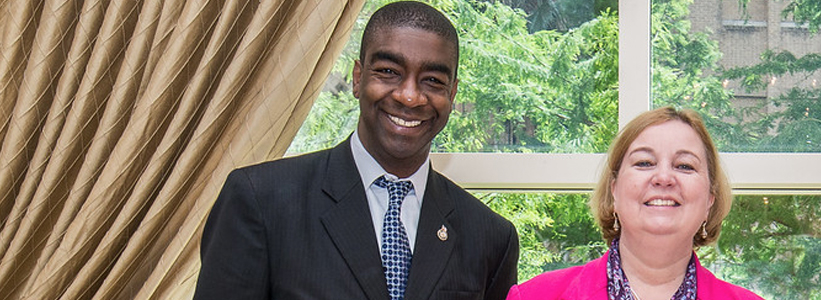Friday, March 11, 2022
We want your voting experience to be "unrivaled!"
By Thomas Hicks, Matthew Masterson and Christy McCormick
During our recent visit to Joint Base San Antonio, where the mission is to provide “unrivaled installation support and service to enable Mission Partner Success,” we had the opportunity to affirm that the U.S. Election Assistance Commission (EAC) has a similar duty to provide “unrivaled” support for the state and local officials who carry out federal elections. That includes ensuring our nation’s men and women in uniform have the ability to successfully cast their ballot from posts across the globe.
As we travel to voting jurisdictions across the country, state and local election officials consistently express a desire to better serve military voters and to have a fuller appreciation for the serious hurdles that can impede armed service members from participating in elections. Similarly, military voters share stories about receiving their ballot after Election Day or not having the ability to return their ballot on time. These challenges are real and unacceptable. Those who devote their lives to defending our democracy should certainly have the ability to shape it. The EAC is committed to helping state and local officials better serve our armed forces personnel and provide them with the support they need to successfully have their vote counted.
An important part of this work is the EAC’s partnership with the Department of Defense’s Federal Voting Assistance Program (FVAP), which championed important 2016 efforts to better serve military voters. It’s vital to provide uniformed service personnel and their families with specific information on obtaining ballots and returning them in time to be counted. We also have a more general focus on improving the overall voting experience by providing resources to the state and local election officials who serve deployed military personnel. At the EAC, we know that these improvements are not only necessary, but are important to increasing participation from this important segment of U.S. voters.
In order to better understand how the EAC can help military and overseas voters, we turn to data. Based on information collected by both the EAC and FVAP, we know in 2014 states transmitted 420,094 ballots to voters who are guaranteed the right to successfully cast a ballot under the Uniformed and Overseas Citizens Absentee Voting Act (UOCAVA). While no formal count of Americans living overseas exists, various organizations estimate that eligible population to be between 2.5 and 8 million, and possibly more. Almost half of the ballots that were transmitted prior to the 2014 election were sent to uniformed services members and the rest were sent to civilian citizens living overseas. Of the UOCAVA ballots transmitted, only 34.6% were returned and submitted for counting, a slight increase from the 30.2% in 2010. States reported counting 137,683 UOCAVA ballots, or 94.6% of the total submitted for counting, and rejecting 8,492 ballots. The most common reason given for rejecting a UOCAVA ballot was that the ballot was not received on time. Election officials are actively working to address this issue and continue this trend of receiving and counting more overseas ballots.
The EAC and FVAP are currently collecting UOCAVA data for 2016. This information is used to guide the allocation of resources needed to reduce obstacles to voting, expand UOCAVA voter awareness and outreach initiatives for those under this designation, and to enhance measures of effectiveness and participation. The EAC and FVAP’s ongoing work to coordinate our statutory requirements to survey election officials about UOCAVA voters’ experiences eliminates redundancies, lessens the overall burden on states asked to provide these important data points and improves the overall accuracy of the data.
In addition to our partnership with FVAP, the EAC works in other ways to improve the voter experience for military personnel and their families. We seek out opportunities to visit military bases across the United States and speak face-to-face with uniformed service personnel. Your stories, your feedback about what’s working well and what’s missing the mark help us to chart the right course forward and make adjustments in real-time. We will also continue to create online resources and web videos that target overseas voters, to advise the Military Postal Service, the U.S. Postal Service and other government agencies on best practices to increase military voter participation and to enhance the voter experience for armed service personnel and other voters who are overseas.
This year, a core part of the EAC’s mission is to make sure every American, including the men and women who serve in the U.S. military, has the ability to successfully and securely cast his or her election ballot and have it counted. We want to be “unrivaled” in this work and we thank our nation’s military personnel for the important role you play in helping us define and achieve success. We ask that you please continue to share your stories with us and let us know how we can help.
As Military Appreciation Month draws to a close, we are keenly aware that one of the best ways to thank our country’s military personnel is to do all that we can to protect your rights while they you deployed defending ours. We are committed to continuing our partnership with FVAP and other federal agencies to turn our commission’s survey findings and other feedback into tangible changes that increase the ability for service members and their families to successfully cast their votes.
Matthew Masterson is chairman of the U.S. Election Assistance Commission. Thomas Hicks is vice chairman, and Christy McCormick is a member of the commission.


